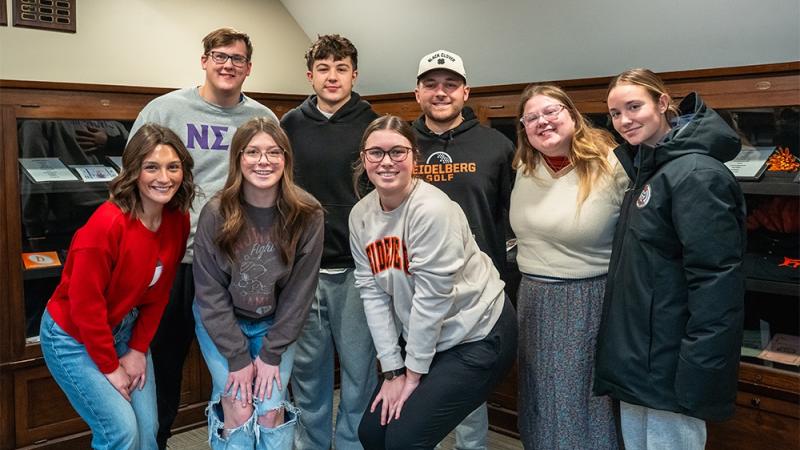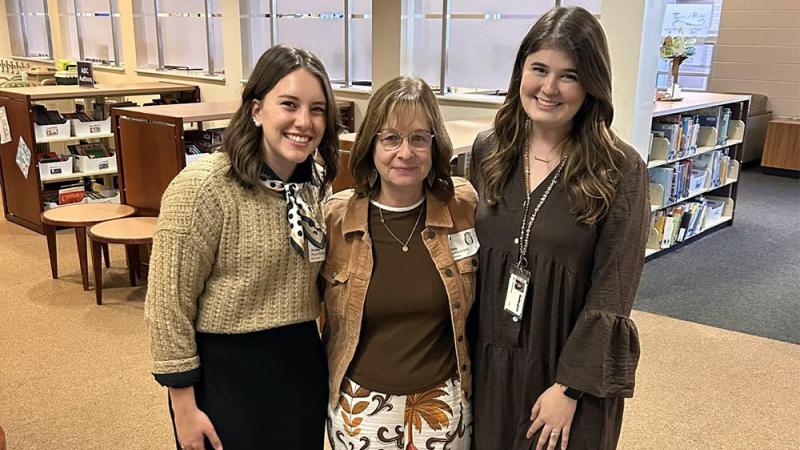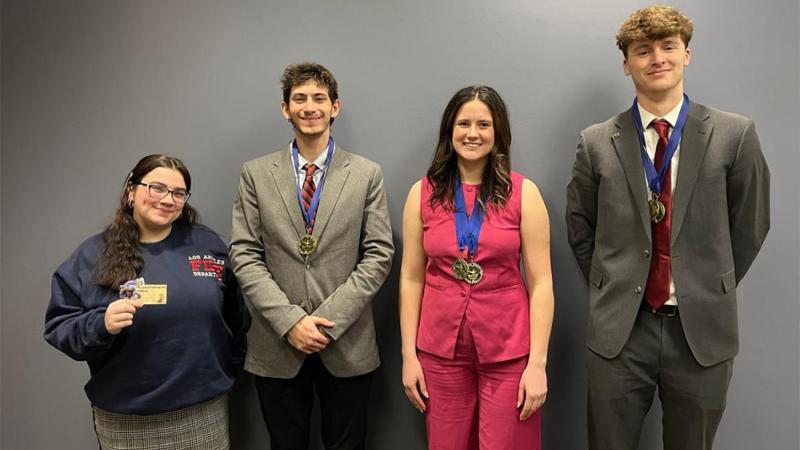Power of the pen (pals): Class connects with incarcerated women

Letter writing is a lost art, especially in the digital age. But Heidelberg students in the pilot course k(NO)w Justice are reviving it with a surprising audience – incarcerated women.
Dr. Sarah Lazzari and Chaplain Paul Stark are team-teaching the NDI 100 course to mostly freshmen as a pilot course for the new gen-ed program. Midway through the semester, a pen pal program is having an impact in multiple – even unexpected – ways. But at its core, it’s about making human connections.
Through her research with current students Kendall Wright and Brooke Franz, Sarah connected with a leadership program at the minimum-security Springer Correctional Center in Springer, New Mexico, to establish a pen pal program between the ‘Berg students and women incarcerated at the facility.
“Our initial focus when we created the course was on the death penalty, but we expanded it to look at the entire criminal justice system,” Sarah explains. “We wanted our students to understand the scope of the criminal justice system and issues related to it.”
The majority of the students in the class don’t have experience with the criminal justice system but some do, she notes, perhaps with loved ones who work in law enforcement or possibly as a victim of a criminal offense. The course not only provides exposure to the system but it challenges the students’ values and beliefs.
“One of the biggest things we want our students to understand is that people in prison are still human beings who are so much more than the worst thing they have ever done. They are not monsters,” she says.
How it works
Every other week, the 24 students in the k(NO)w Justice class compose letters to their assigned pen pals. One student, freshman English major Tallie Dudley, even volunteered to take on two pen pals. On alternating weeks, the students write journal entries, addressing what they are learning from the incarcerated women and how those lessons apply to course content.
“What I’m hearing from them is that this gives them a real-world understanding of what we’re talking about in class, which is so cool,” Sarah says.
The students received instructions in class on structure, composition and prompts for letter writing. Some have opted to hand-write their letters the old-fashioned way and others type them on the computer. They are reviewed by the instructors before being scanned and emailed to the correctional facility. Staff there use the same process before exchanging the inmates’ letters with the ‘Berg students.
“For some of the women, the letters they receive from our students are the only letters they receive. It’s a big deal for those without connections to the outside world,” Sarah says.
Two “embedded peers” – pen pals from the correctional facility – frequently join the class by zoom just to check in and share about the writing experience.
Mutually beneficial learning
The k(NO)w Justice course and the pen pal program have a dual purpose: to expose Heidelberg students to the humanity of the incarcerated women at Springer Correctional Center, reshaping their perceptions of incarcerated people, and to provide an opportunity for the incarcerated women to learn more about a traditional college experience as many of women who pursue higher education in prison encounter barriers to receiving the complete benefits of the college experience.
Ultimately, the hope is that participation as pen pals will help the women as they transition back into their communities, Sarah says.
Ashley Bass, the Programs Manager at Springer, has already started to see the benefits of the program. “I really enjoy seeing how the pen pal program has grown here at Springer Correctional Facility,” she says. “The ladies participating have truly had an opportunity to be open and share their world with someone outside of corrections.”
So, what do the pen pals write about?
The correspondence is all about making a human connection. So the pen pals write about whatever’s on their minds … current events, campus events, extra-curricular activities, sports, music, books, what they’re learning in class about the criminal justice system – even emotions like fears, challenges of being incarcerated, hopes for the future.
Freshman political science and economics major Isaiah Young shares what he has written about. “I have shared small things such as school, sports, my major, what I do for fun,” he says. “But I have also talked about my family without giving too much away.”
Isaiah’s pen pal Ellen, on the flip side, has written to him about why she is in prison, what jobs she has there, her plans post-release “and how she is going to stay free when she gets out.” She told Isaiah that she is dedicated to doing things the right way when she is released.
Ellen’s attitude has impressed Isaiah. “She has a positive attitude when we write, even though she has plenty of reasons to be sad being in prison,” he says. “She gives me joy every time I read a letter from her!”
The two women with whom Tallie is corresponding have daughters about her same age, so they have connected on that level. “They have told me about their families and their daughters, so it is interesting because I can relate to that,” she says.
The ‘Berg students have been surprised about the incarcerated women's openness and willingness to share their life stories.
“They have told me a lot about how they feel and how they want to change their lives and other stories from their past that have caused them to be in the situation that they are in,” Tallie says, adding that she also has been surprised “how much they care about the little things about me just as much as I care about their little things.”
“I love when they tell me exciting things that have happened to them like getting an A on their essay and how excited they are to read Pride and Prejudice in their English class.”
But it’s not all sunshine and roses. The incarcerated women also freely share their deep emotions such as sadness and worry. “That really upsets me (when I read it) because there has been such empathy created between us,” Tallie adds.
The women respond
Ashley, the program director at Springer, asked the women to share why the pen pal program was important for them. Their insights are quite powerful.
From Jennifer: “I want the students to always remember to live. I kinda lost myself in work at times. We always need to learn to be still at moments.”
From Shanicka: “I am so glad and thankful to be part of something that is positive and worthwhile.”
From Brandi: “Just when the caterpillar thought the world was over, it became a butterfly. When I first saw the sign-up sheet, I thought it would be nice to bring some insight into what we go through on a daily basis, and just so the students know that we are humans as well. Just getting our word out there was the greatest chance you gave us.” (Read Brandi’s original poem below.)
Open minds, open hearts
Although the ‘Berg students weren’t sure what to expect, they kept an open mind going into the pen pal assignment. After writing and receiving five letters with two to go, their eyes and hearts have been opened even further.
Isaiah believes “the real world does not care about prisoners and that is truly sad.” He wants his pen pal to know that she matters. “They are people too and deserve to be cared about,” he says.
Letting her guard down, Tallie has discovered that “we are a lot more alike than you would think.” And she wants people to know that incarcerated individuals are often judged unfairly. “People look down upon incarnated individuals without knowing their stories,” she says. “These women are real people with families and they are funny, nice and caring women. Because they have made some poor choices, they are stuck in awful stereotypes.”
“People are people, and even when you don’t think you will relate to someone, talking with them might prove you wrong,” Tallie concludes.
We are all still Human
written by Brandi Raecine Eubank
Yes we are all still human
We disobeyed the law
Came to prison, just doing our sentences
Some of us are lifers, some of us little timers
We are all still human
Some of us black, white, and brown
Just shades of many colors
We all have something in common
We did do our crimes, and now we’re doing our times
Can you read between the lines?
We are all still human
Some of us stay, some of us go
Some of us take a different road
Changing our ways, try to adapt
Staying sober to stay on the right track
We are all still human
Society looks at us and considers is 2nd class
We became felons and now they have labeled us bad
Because of our past
They don’t care that we are still human




